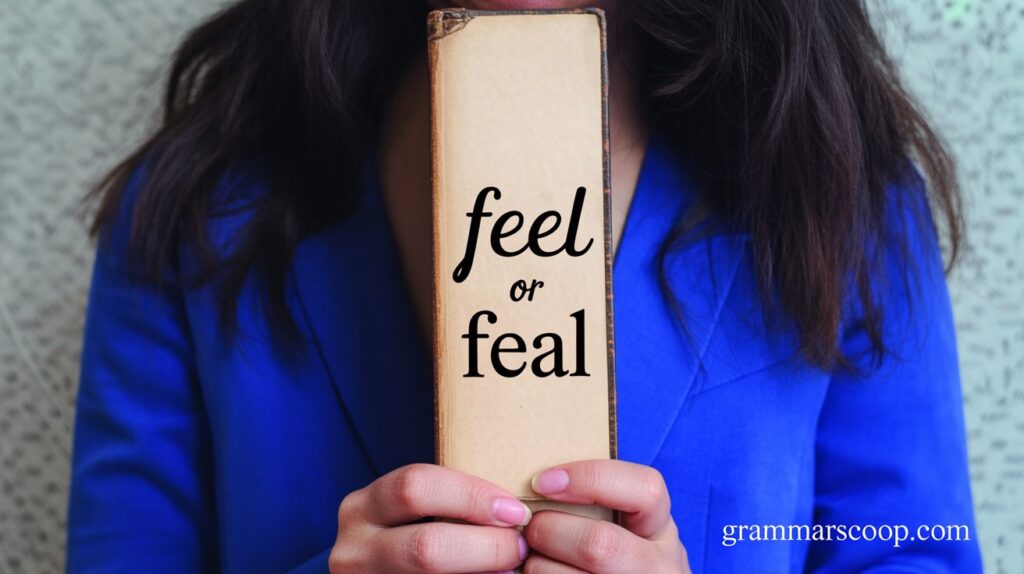Language is a living thing. It evolves, sheds old skins, and picks up new expressions. Yet, sometimes, an old word sneaks into modern conversation, sparking confusion. Case in point: Feel Or Feal. Are they the same? Is “feal” even a real word? If you’ve ever paused to wonder about this peculiar pair, you’re not alone.
Let’s dive deep into feal vs feel, exploring their definitions, origins, usage, and differences. Whether you’re a student, writer, or language lover, this guide will clear things up once and for all.
Quick Summary
The words Feel Or Feal may sound identical, but they serve entirely different purposes in English. “Feal” is an archaic adjective meaning loyal or faithful, rarely used today except in historical or poetic contexts. On the other hand, “feel” is a widely used verb and noun that refers to physical sensations or emotional states. While “feal” has its roots in Old French and Latin, “feel” evolved from Old English and remains a vital part of modern vocabulary. If you’re writing everyday English, “feel” is almost always the correct choice—“feal” belongs in the past.
At a Glance – Feal vs Feel
| Word | Part of Speech | Meaning | Usage Today | Origin |
|---|---|---|---|---|
| Feal | Adjective | Loyal, faithful | Archaic (rare) | Old French / Middle English |
| Feel | Verb / Noun | To sense, to experience | Common | Old English |

- “Feal” means faithful or loyal, but it hasn’t been used in modern English for centuries.
- “Feel” is a modern verb and noun, one you use every day—to express emotions, sensations, and touch.
What Does Feal Mean?
Feal Definition & Modern Equivalent
Feal (adjective): Loyal, faithful, especially to a person or sovereign.
You might recognize its echo in the more modern word fidelity. In medieval texts, knights were described as “feal” to their kings.
Is Feal a Real Word in English?
Yes—but barely. Feal is an archaic English word, rooted in the Middle English period. It’s not used in contemporary writing or conversation unless you’re aiming for historical flair or poetic nostalgia.
Feal Meaning in Historical Literature
Writers like Chaucer and Spenser used “feal” in epic tales and poems:
“Be thou feal and true as a knight must be…” — Anonymous ballad, 14th century
This usage was poetic and noble, conjuring ideas of honor and allegiance—often tied to chivalric or romantic ideals.
Origins and Etymology of Feal

Understanding where words come from gives them dimension.
Word Origins of Feal
- Old French: feal, meaning “faithful”
- Latin: fidelis, meaning “trustworthy” or “loyal”
- Middle English: adopted directly from French, often appearing in verse
Feal was widely used between the 13th and 17th centuries before being replaced by more modern synonyms like “loyal” and “faithful.”
Why Did Feal Disappear?
Simple evolution. The English language absorbed multiple influences—Latin, Norse, Norman French—and shed older words that fell out of fashion. Feal was overtaken by clearer and more commonly understood words.
What Does Feel Mean?
Feel Definition and Part of Speech
Feel functions as both a verb and a noun, making it versatile.
- Verb: to touch or experience emotion or sensation
- Noun: a general impression, texture, or atmosphere
Examples:
- “I feel happy.”
- “The blanket feels soft.”
- “This cafe has a cozy feel.”
Examples of Feel in Context
Feel as a Verb
- “Can you feel the breeze?”
- “She felt a sense of dread.”
Feel as a Noun
- “The movie had a nostalgic feel.”
- “You’ll get the feel for it after a few tries.”
Why Feel Is Important in Modern English
It’s one of the most emotionally loaded verbs in the language. Feel connects us to our senses and emotions. You use it when you’re excited, confused, hurt, or simply picking out socks in the morning.
Key Differences Between Feel Or Feal

Let’s break down the difference between feal and feel across multiple dimensions:
Definition and Usage
| Feature | Feal | Feel |
|---|---|---|
| Type | Adjective | Verb / Noun |
| Meaning | Loyal, faithful | Sense, touch, emotion |
| Frequency | Obsolete | Very common |
Spelling and Pronunciation
Both are pronounced the same: /fiːl/. This makes them homophones—words that sound alike but differ in meaning and spelling. That’s a key reason why people confuse them.
Historical vs Modern Relevance
- Feal belongs to medieval texts and poetic works.
- Feel belongs everywhere else—texts, conversations, books, websites.
Similarities and Confusion
- Sound identical
- Look similar
- Entirely different meanings
A classic case of homophones that confuse writers.
Explore further:
- Writting or Writing: Never Get Confused Again
- Pre vs Post: Which Prefix to Use and Why It Matters
- Long Term or Long-Term: What’s the Right Choice in Writing?
- What’s the Past Tense of Tear? Is it Tore, Teared, or Torn?
- excel vs accel: What Is the Correct Spelling?
Synonyms and Alternatives
Synonyms for Feal
While feal is no longer common, its synonyms are:
- Loyal
- Faithful
- True
- Devoted
- Steadfast
Synonyms for Feel
Depending on how “feel” is used:
As a Verb:
- Sense
- Perceive
- Touch
- Detect
As a Noun:
- Vibe
- Texture
- Mood
- Atmosphere
Quick Comparison Table of Synonyms
| Context | Feal Synonyms | Feel Synonyms |
|---|---|---|
| Loyalty | Loyal, true | N/A |
| Senses | N/A | Sense, touch |
| Emotions | Devoted, steadfast | Perceive, experience |
| Atmosphere | N/A | Mood, vibe |
Feeling vs Fealing – Is Fealing Even a Word?
Short answer? No.
Fealing is a common misspelling of either:
- “Feeling” — correct modern word
- “Feal” — archaic, but rarely ever seen in -ing form
Search engines might autocorrect it, but it’s not standard English. So if you see “fealing,” assume it’s a typo.
Common Mistakes to Avoid
- “I feal happy.” Wrong
Correct: “I feel happy.” Right - “His fealing was hurt.” Wrong
Correct: “His feeling was hurt.” Right - “A feal friend is rare.” Right (Only in poetic or old-English contexts)
Modern Alternative: “A loyal friend is rare.” Right
How to Know Which to Use
Here’s a cheat sheet for writers, ESL learners, and curious minds.
- Use “feel” for emotions, touch, experience, or descriptions.
Example: “I feel cold.” - Use “feal” if you’re quoting medieval literature, writing fantasy, or mimicking old English.
Example: “My feal servant, ever by my side.” (Think: Game of Thrones) - Never use “fealing” unless you’re inventing a fantasy language.
Quick Quiz – About Feel Or Feal
Fill in the blank:
- “She could ___ the tension in the room.”
- “A ___ knight defends his queen.”
- “He spoke with deep ___ about the loss.”
- “The fabric has a smooth ___.”
- “Be ___ and true to your cause.”
Answers:
- Feel
- Feal
- Feeling
- Feel
- Feal
Case Study: Literature vs Everyday Speech
Let’s compare how each word appears in real-world contexts.
Feal in Literature:
“Be feal and true, for honor binds thee.” — Medieval Romance, 1430
This line illustrates loyalty and chivalric duty.
Feel in Speech:
“I feel like going for a walk.” — Modern usage
Completely different tone, context, and meaning.
FAQ – Feel Vs Feal
- What does feal mean?
It means loyal or faithful—but it’s an archaic term.
- What does feel mean?
To sense, touch, or experience something physically or emotionally.
- Is “feal” still used today?Rarely. Only in historical fiction, poetry, or academic contexts.
- What’s the difference between feeling and feal?
Feeling relates to emotions or sensations. “Feal” refers to loyalty.
- How do you use feal in a sentence?
The feal knight pledged allegiance to his king.”
- Is fealing a word?
No, it’s a misspelling of either “feal” or “feeling.”
Conclusion of Feel Or Feal
Words can trick the ear and fool the eye. Feel Or Feal is a textbook case of how pronunciation and spelling don’t always align. While feel is here to stay—used every day to express touch and emotion—feal belongs in the past, dusted off only when writing about knights, kingdoms, and olden tales.

Lisa Morris is a seasoned blogger and language enthusiast with a passion for making grammar simple and engaging. At Grammar Scoop, she shares clear, concise tips that help readers master the rules of English with confidence.






